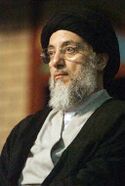Supreme Leader of Kadaria
| Supreme Leader of the National Guidance Council | |
|---|---|
| Միլլէթ Գըլաղուզլիգ Գոնսէեի Գըլաղուզ Millet Kılağuzlik Konsey-i Kılağuz | |
 | |
| National Guidance Council | |
| Style | His Eminence |
| Status | Head of State Head of Government |
| Abbreviation | Kılağuz, supreme leader, guide |
| Member of | National Guidance Council |
| Residence | Gökçebahçe, Ispandikyan |
| Appointer | Conclave of Experts for National Leadership |
| Term length | Life tenure |
| Constituting instrument | Declaration of the Founding Principles of the Irfanic State |
| Precursor | Prime Minister of Kadaria |
| Formation | 1952 |
| First holder | Alparslan Candar |
The Supreme Leader of the National Guidance Council (Kayig: Միլլէթ Գըլաղուզլիգ Գոնսէեի Գըլաղուզ, Millet Kılağuzlik Konsey-i Kılağuz), often shortened to Kılağuz ("Guide" or "Leader") is the head of state and government of Kadaria through the title's position as head of the National Guidance Council. All state organs and apparatuses are required to obey the commands of the Supreme Leader when required, and declarations issued by the office are considered to be above Kadarian law and, by extension, the national constitution. Because of this, the position is considered to be the most powerful in the Kadarian government, and the officeholder considered to be the most powerful person in the Kadarian political system.
Compared to similar head of government posts in Euclean and other Coian nations, the position of Supreme Leader is much more involved in the day-to-day running and policy decision-making within Kadaria. In addition to the roles normally entitled to a head of government, the supreme leader has many plenary powers making the position's power on the Kadarian political system absolute. Aside from serving as the head of the National Guidance Council, the supreme leader also serves as the commander-in-chief of the Kadarian Armed Forces, directly appoint and dismiss government ministers, including members of the National Guidance Council, can appoint and dismiss members of the Meclisi and the nation's judiciary, and has control over national television, censorship, and government transparency.
The position was created with the ratification of the Declaration of the Founding Principles of the Irfanic State in 1952 following the immediate aftermath of the Irfanic Revolution of 1951. The role was created in pursuant of the leadership concept perpetrated by husnas in Dynastic Kadaria, which called for a strong, centralized leadership authority to lead the besieged husna. Thusly, the supreme leader could be understood as being a husna-hıdiv with the nation acting as the husna. The inaugural holder of supreme leader was Alpaslan Candar, a prominent military commander who gained fame for his leadership during the Great War. Since Candar, there have been seven supreme leaders; three coming from military backgrounds and four being Irfanic clergymen. The current supreme leader is Gen. Enver Taşdemir, who was elected in 2007.
The supreme leader is elected by the Conclave of Experts for National Leadership. In theory, the Conclave also acts as an oversight body for the position, however, it has never exercised this role in any capacity since its creation following Candar's death in 1969. Thirty-five people make up the membership of the Conclave, with their backgrounds coming from influential military officers, clergymen, and businessmen and other technocrats. Half of all members to the Conclave are appointed by the supreme leader, who can also dismiss them at any time. The supreme leader is not allowed to directly appoint successors, due to fears of the position turning hereditary.
The title "kılağuv" is commonly used as a term of respect and admiration, and can be translated as either "guide" or "commander, leader."
Functions and powers
The Supreme Leader of Kadaria holds absolute power over the sociopolitical and economic systems of the nation under the terms outlined in the Declaration of the Founding Principles of the Irfanic State. As such, the functions and powers of the office are:
- Appointment, dismissal, and acceptance of resignation of:
- Members of the National Guidance Council.
- Members of the Sublime Guardianship Council.
- Clergy members of the Meclisi of the Irfanic State.
- the Chief Justice.
- Government ministers.
- the chief of the joint staff.
- chief commander of the armed forces.
- high ranking commanders of the armed forces.
- the head of radio and television networks
- Supreme command over the Armed Forces.
- Declaration of war and peace, and the mobilization of the armed forces.
- Ability to veto laws passed by the Meclisi.
- Resolve difference between the three branches of government.
- Issue national decrees.
- Dismiss and reinstate any government minister at any level of government.
- Pardoning or reducing the sentences of convicts in accordance to Irfanic law.
- Issuing decrees formalizing national elections.
- Control over military and religious courts.
List of Supreme Leaders
| No. | Portrait | Name | Term | Notes |
|---|---|---|---|---|
| 1 |  |
– 29 June, 1969 |
First Supreme Leader | |
| 2 |  |
– 17 March, 1974 |
Assassinated by X. | |
| 3 |  |
– 31 July, 1986 |
Also served as Grand Custodian of Kadaria. | |
| 4 |  |
– 23 October, 1994 |
||
| 5 |  |
– 3 February, 2001 |
||
| 6 |  |
– 21 April, 2007 |
||
| 7 |  |
– Present |
